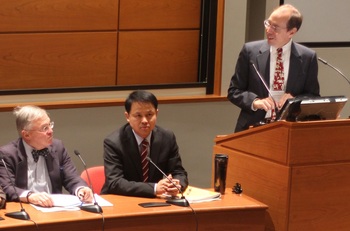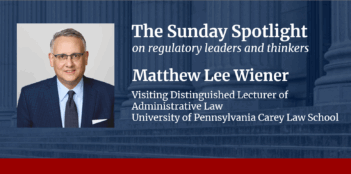
Leading Chinese and American scholars discuss possibilities for legal development.
Chinese and American scholars recently met at the University of Pennsylvania Law School to discuss the current state of administrative law in China, and how agency decision making can be made more effective, transparent, responsive, and participatory.
The conference, called “The Future of Chinese Administrative Law,” was made up of a unique mix of Chinese professors of administrative law, American scholars studying China, and experts in U.S. administrative law. Conference organizer Neysun Mahboubi, a research fellow at the University of Connecticut School of Law and visiting scholar at the University of Pennsylvania’s Center for the Study of Contemporary China pointed to the value of bringing this cross-national collection together and seeing “if these different groups with overlapping interests can have a conversation that is interesting and meaningful.”
Mahboubi explained that the “main goal of the conference to facilitate dialogue between US and Chinese administrative law scholars, at what appears to be an important moment for the further development of Chinese administrative law.” Zhou Hanhua, Wang Xixin, He Haibo, Song Hualin, Lin Yan, and Zheng Chunyan, all distinguished or leading younger administrative law scholars from China each presented a paper and received comments from two American scholars, of administrative law and Chinese law respectively.
China only began to develop an American-style administrative law, rooted in values like due process, transparency, and citizen redress, starting in the late 1980s. First, the Chinese Administrative Litigation Law formalized procedures for citizens to sue the government when they believed a rule or regulation was applied improperly. Subsequent legislation has fleshed out a broader administrative law framework. This includes a State Compensation Law, which allows aggrieved citizens to collect monetary damages if their claim against the government is successful, and an Administrative Reconsideration Law, which provides for agency review and permits citizens to ask regulators to modify the general rules underlying their particular actions. Additional legislation has supplied procedural standards for when agencies impose penalties, issue licenses, and engage in coercive enforcement, respectively. The Law on Legislation passed in 2000 and subsequent rules introduce some measure of public participation in the formulation of agency regulations.

Administrative law may have a special significance in China because the government is not a representative democracy. These administrative law structures function as a primary conduit through which citizens communicate with the state. “Law and legal reform in China are perhaps some of the most important areas for advancing broader political reform,” said Mahboubi. “The last few years have been very difficult generally, but it does appear that there may be some positive developments in administrative law.”
Jacques deLisle, a law professor and director of Penn’s Center for East Asian Studies, echoed Mahboubi’s sentiment, noting that a wide range of reformers in China “have certain goals which include greater transparency of governance, greater accountability…, greater public input and the beneficial checks that can come from holding government to account for breaking its own laws.”
Some officials within the Chinese Communist Party appear to support administrative law reform because they see it as a way of “structuring the state to make it more effective,” said deLisle. In fact, he added, even conservative leaders “see a problem of institutional weakness, of chaos, of corruption, of excessive uses of un-granted powers at the local level.” A stronger system of administrative law can address these problems.
One paper challenged students of Chinese law and politics to look beyond the centralized power structure for innovation. Local and provincial governments frequently conduct creative experiments in administrative law. In his paper, “Chinese Administrative Procedure Reform in the Context of Governance Transition: What Changed? How to Move Forward?”, Peking University Law School Professor Wang Xixin noted that one of the factors facilitating administrative law reform was local party officials’ experimentation. If they try something that proves successful, even if unorthodox, they are more likely to be promoted.
Although many observers see the Administrative Litigation Law as an important step towards responsiveness by the Chinese government, an empirical analysis by Professor He Haibo of Tsinghua University School of Law, “Litigation without a Ruling: The Predicament of Administrative Law in China,” argued that the law has not lived up to its potential. Professor He found that a high and growing percentage of plaintiffs withdrew their claims before final adjudication. The paper suggested the withdrawals could be due to excessive delay created by judges who drag proceedings on indefinitely because they are afraid to upset the decisions of more powerful agencies.

Some reformers in China still hope the government will pass a broader law governing all administrative action, modeled in part on the U.S. Administrative Procedure Act. At one point, that law was listed as a top legislative priority at the National People’s Congress, but Mahboubi and deLisle both said the law has been removed from that body’s shortlist and was unlikely to be enacted in the near future. The amendment of existing laws or the enactment of narrower rules addressing specific concerns are the mostly likely path for reform.
Professor deLisle pointed out that the conference at Penn is simply the “latest installment in a conversation that, in a broad sense, has been going on for 30 years.”
By bringing leading Chinese legal scholars together with leading U.S. scholars, the organizers of the Penn conference sought to draw lessons for China from American administrative law. “It is clear that China now faces the same regulatory problems that the U.S. and other major economies confront,” said Cary Coglianese, director of the Penn Program on Regulation and professor of law at Penn.
“Although China will work to find its own designs, the U.S. experience in making government transparent and participatory can provide a basis for the designers of Chinese administrative law to move forward with law reform,” he added.
Professor Coglianese emphasized that the conversation also can benefit American lawyers and legal scholars. After all, American businesses now have to navigate the Chinese regulatory landscape. Furthermore, with imports from China continuing to grow, American consumers have effectively become bystanders to the successes and failures of China’s regulatory schemes.
The symposium was part of a week-long trip for the visiting Chinese academics. Immediately preceding the Penn conference, they met with federal appellate court judges and officials from various federal agencies in Washington, D.C. and spoke at American University‘s Washington College of Law. They also subsequently participated in an administrative law conference organized by the American Bar Association (ABA).
The symposium held at Penn Law was cosponsored by Penn’s Center for the Study of Contemporary China, the Center for East Asian Studies, the Penn Program on Regulation, the Floersheimer Center for Constitutional Democracy at Cardozo Law School, and the ABA’s Section of Administrative Law & Regulatory Practice. The week-long visit by the Chinese scholars also received support from American University’s Washington College of Law and the U.S. Chamber of Commerce. The papers presented at the Penn symposium will be published in an upcoming edition of the East Asia Law Review.



